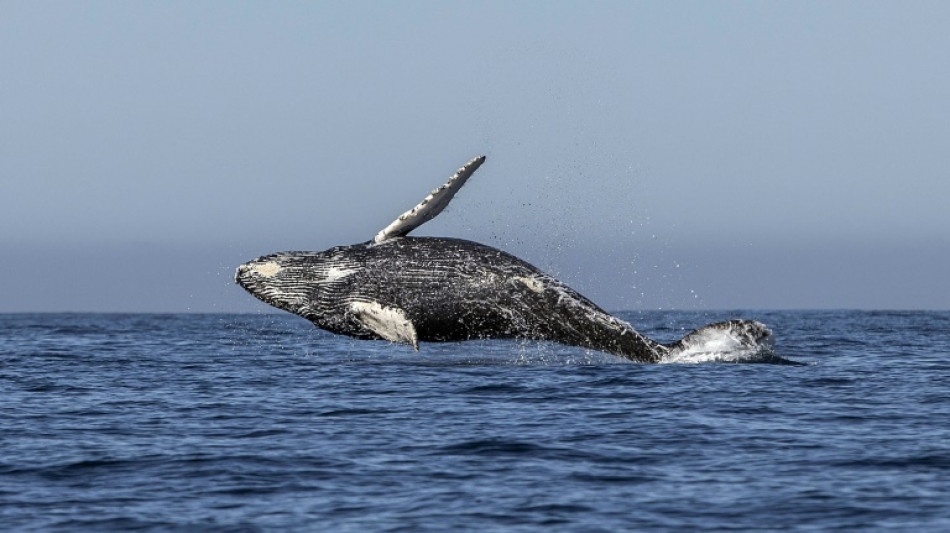
-
 Moscow chokes Telegram as it pushes state-backed rival app
Moscow chokes Telegram as it pushes state-backed rival app
-
ArcelorMittal confirms long-stalled French steel plant revamp

-
 New Zealand set new T20 World Cup record partnership to crush UAE
New Zealand set new T20 World Cup record partnership to crush UAE
-
Norway's Ruud wins Olympic freeski slopestyle gold after error-strewn event

-
 USA's Johnson gets new gold medal after Olympic downhill award broke
USA's Johnson gets new gold medal after Olympic downhill award broke
-
Von Allmen aims for third gold in Olympic super-G

-
 Liverpool need 'perfection' to reach Champions League, admits Slot
Liverpool need 'perfection' to reach Champions League, admits Slot
-
Spotify says active users up 11 percent in fourth quarter to 751 mn

-
 AstraZeneca profit jumps as cancer drug sales grow
AstraZeneca profit jumps as cancer drug sales grow
-
Waseem's 66 enables UAE to post 173-6 against New Zealand

-
 Stocks mostly rise tracking tech, earnings
Stocks mostly rise tracking tech, earnings
-
Say cheese! 'Wallace & Gromit' expo puts kids into motion

-
 BP profits slide awaiting new CEO
BP profits slide awaiting new CEO
-
USA's Johnson sets up Shiffrin for tilt at Olympic combined gold

-
 Trump tariffs hurt French wine and spirits exports
Trump tariffs hurt French wine and spirits exports
-
Bangladesh police deploy to guard 'risky' polling centres

-
 OpenAI starts testing ads in ChatGPT
OpenAI starts testing ads in ChatGPT
-
Three-year heatwave bleached half the planet's coral reefs: study
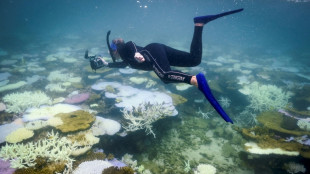
-
 England's Buttler calls McCullum 'as sharp a coach as I ever worked with'
England's Buttler calls McCullum 'as sharp a coach as I ever worked with'
-
Israel PM to meet Trump with Iran missiles high on agenda

-
 Macron says wants 'European approach' in dialogue with Putin
Macron says wants 'European approach' in dialogue with Putin
-
Georgia waiting 'patiently' for US reset after Vance snub

-
 US singer leaves talent agency after CEO named in Epstein files
US singer leaves talent agency after CEO named in Epstein files
-
Skipper Marsh tells Australia to 'get the job done' at T20 World Cup

-
 South Korea avert boycott of Women's Asian Cup weeks before kickoff
South Korea avert boycott of Women's Asian Cup weeks before kickoff
-
Barcelona's unfinished basilica hits new heights despite delays

-
 Back to black: Philips posts first annual profit since 2021
Back to black: Philips posts first annual profit since 2021
-
South Korea police raid spy agency over drone flight into North

-
 'Good sense' hailed as blockbuster Pakistan-India match to go ahead
'Good sense' hailed as blockbuster Pakistan-India match to go ahead
-
Man arrested in Thailand for smuggling rhino horn inside meat
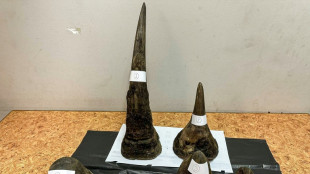
-
 Man City eye Premier League title twist as pressure mounts on Frank and Howe
Man City eye Premier League title twist as pressure mounts on Frank and Howe
-
South Korea police raid spy agency over drone flights into North

-
 Solar, wind capacity growth slowed last year, analysis shows
Solar, wind capacity growth slowed last year, analysis shows
-
'Family and intimacy under pressure' at Berlin film festival

-
 Basket-brawl as five ejected in Pistons-Hornets clash
Basket-brawl as five ejected in Pistons-Hornets clash
-
January was fifth hottest on record despite cold snap: EU monitor
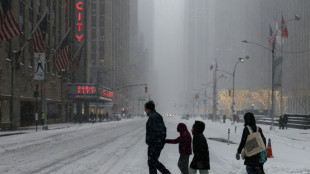
-
 Asian markets extend gains as Tokyo enjoys another record day
Asian markets extend gains as Tokyo enjoys another record day
-
Warming climate threatens Greenland's ancestral way of life
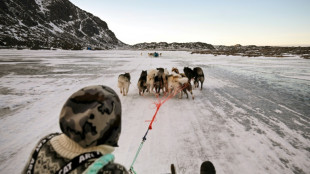
-
 Japan election results confirm super-majority for Takaichi's party
Japan election results confirm super-majority for Takaichi's party
-
Unions rip American Airlines CEO on performance

-
 New York seeks rights for beloved but illegal 'bodega cats'
New York seeks rights for beloved but illegal 'bodega cats'
-
Blades of fury: Japan protests over 'rough' Olympic podium

-
 Zelensky defends Ukrainian athlete's helmet at Games after IOC ban
Zelensky defends Ukrainian athlete's helmet at Games after IOC ban
-
Jury told that Meta, Google 'engineered addiction' at landmark US trial

-
 Despite Trump, Bad Bunny reflects importance of Latinos in US politics
Despite Trump, Bad Bunny reflects importance of Latinos in US politics
-
Intrusion Inc. Expands Business Development Efforts With Strategic Leadership Additions

-
 Osa Commerce Launches AI-Powered Retail Compliance at Manifest 2026 Targeting $5 Billion Chargeback Problem
Osa Commerce Launches AI-Powered Retail Compliance at Manifest 2026 Targeting $5 Billion Chargeback Problem
-
Datavault AI Recaps High-Impact Super Bowl LX Weekend with NFL Alumni, Live ADIO(R) Activations, DVHOLO(TM) and Tokenization

-
 Aspire Biopharma Regains Compliance with Nasdaq Minimum Bid Price Requirement
Aspire Biopharma Regains Compliance with Nasdaq Minimum Bid Price Requirement
-
Charlie's Holdings (OTCQB:CHUC) Selected for FDA Premarket Tobacco Product Applications Meeting


Heatwaves may be driving whale decline in Pacific: study
The number of North Pacific humpback whales plummeted 20 percent in less than a decade, and marine heatwaves may be the main culprit, according to a study released Wednesday that spells a troubled future for the majestic sea mammals.
Thanks to conservation efforts and the end of commercial whaling in 1976, the region's humpback population steadily increased until 2012.
But over the last decade, whale numbers have declined sharply, researchers reported in the journal Royal Society Open Science.
A team of 75 scientists compiled the largest photo-identification dataset ever created for a large marine mammal to track North Pacific humpback populations from 2002 to 2021.
Using images of the whale's unique tails the team was able to log some 200,000 sightings of more than 33,000 individuals.
Up to 2012 the humpback population steadily increased, and it was widely assumed it would eventually level off at their natural "carrying capacity" -- the number of whales the ocean can support.
Instead, they saw a steep population decline.
From 2012 to 2021 the number of humpbacks fell 20 percent from some 33,000 individuals to just over 26,600.
For a subset of whales that wintered in Hawaii, the drop was even more pronounced: 34 percent.
That turned out to be a highly significant difference.
From 2014 through 2016 the strongest and longest marine heatwave ever recorded ravaged the Pacific northeast with temperate anomalies sometimes exceeding three to six degrees Celsius, altering the marine ecosystem and the availability of humpback prey.
"My jaw was on the floor," study author Ted Cheeseman, whale biologist and a PhD student at Southern Cross University in New South Wales, told AFP. "This is a much bigger signal than we expected."
"Our estimation is that about 7,000 whales mostly starved to death," he said.
It is normal even in healthy populations for numbers to fluctuate, but such an abrupt decline for a long-lived species points to a major disruption in the oceans.
- 'The ceiling crashed' -
In this case, the scientists speculate, the extreme marine heat actually reduced the carrying capacity threshold for humpbacks.
"Instead of the whales coming up to the ceiling, the ceiling crashed down on the whales," Cheeseman said.
The fact that humpbacks were unable to shift their already flexible diet is a telltale indicator for overall ocean health.
"It's not just the whales' food that declined," Cheeseman added, noting drops in the populations of tufted puffins, sea lions, and seals. "A warmer ocean produces less food."
Some commercial fisheries also felt the impact.
According to the Intergovernmental Panel on Climate Change, marine heatwaves -- already more frequent and intense -- are projected to increase globally over the course of this century.
- Still a success story -
For hundreds of years, whalers from across the planet hunted humpback whales for their oil, meat and baleen, their feeding filtration system.
By 1986, the IUCN had listed the species as globally endangered.
Humpback whales continue to face threats today, primarily from ship strikes and entanglements in fishing nets.
But international restrictions on commercial whaling allowed the global humpback whale population to rebound to more than 80,000 mature individuals.
But today conservation goes hand-in-hand with climate action.
"It is a great success story that these whales are no longer in immediate danger of extinction like they were 50 years ago," Cheeseman said.
"And yet, there's a new reality of changing oceans that we have to live with."
M.Fischer--AMWN


